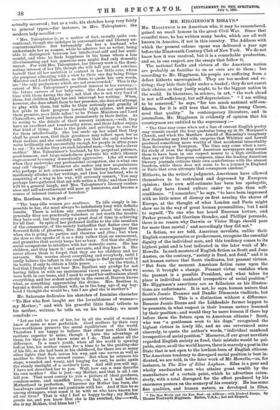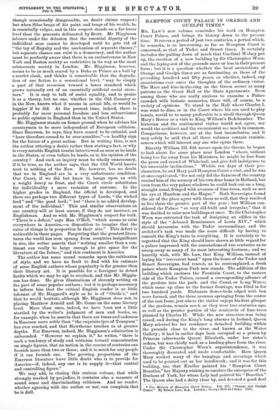MR. HIGGINBON'S ESSAYS.*
MR. Ilmonrsorr is an American who, it may be remembered, gained no small honour in the great Civil War. Since that eventful time, he has written many books, which are all well known in America, if not in this country. The Address with which the present volume opens was delivered a year ago before the Nineteenth Century Club of New York. We do not
know how it was received, but it is a remarkable production, and so, in one respect, are the essays that follow it.
The national faults and virtues of the American nation are probably as familiar to us as ours are to them ; but according to Mr. Higginson, his people are suffering from a defect hitherto unrecognised. They are too modest and re- tiring; they hide their light under a bushel; they do not assert their claims, as they justly might, to be the biggest nation in the world. In literature, in science, in art, "the rock ahead is not self-sufficiency, but self-depreciation." "I am willing
to be censured," he says, "for too much national self-con- fidence, for it is still true that we, like the young Cicero, need that quality." In contemporary literature, and in
journalism, Mr. Higginson is evidently of opinion that his countrymen are entitled to the supremacy :—
"The time may come when not a line of current English poetry may remain except the four quatrains hung up in St. Margaret's Church, and when the Matthew Arnold of Macaulay's imaginary New Zealander may find with surprise that Whittier and Lowell produced something more worthy of that accidental immortality than Browning or Tennyson. The time may come when a care- ful study of even the despised American newspapers may reveal them to have been in one respect nearer to a high civilisation than any of their European compeers, since the leading American literary journals criticise their own contributors with the utmost freedom, while there does not seem to be a journal in England or Paris that even attempts that courageous candour."
Hitherto, in the writer's judgment, Americans have allowed themselves to be restrained and depressed by European opinion; their own self-estimate has been too apologetic, and they have found culture easier to gain than self-
confidence. "I remember," he says, "to have been impressed with no little sense of dismay on first nearing the shores of Europe, at the thought of what London and Paris might show me in the way of great human personalities; but I said to myself, To one who has heard Emerson lecture, and Parker preach, and Garrison thunder, and Phillipri persuade, there is no reason why Darwin or Victor Hugo should pass for more than mortal;' and accordingly they did not."
In fiction, we are told, American novelists, unlike their English contemporaries or predecessors, recognise the essential dignity of the individual man, and this tendency comes to its highest point and is best indicated in the later work of Mr.
Howells. In such masters of English fiction as Scott and Jane Austen, on the contrary, "society is fixed, not fluid," and it is not human nature that Scott vindicates, but peasant virtues. "But from the moment American fiction came upon the scene, it brought a change. Peasant virtue vanishes when the peasant is a possible President, and what takes its place is individual manhood irrespective of social position."
Mr. Higginson's assertions are as fallacious as his illustra- tions are unfortunate. It is not, he says, human nature that Scott's Jeanie Deanses and Dandie Dinmonts vindicate, but peasant virtues. This is a distinction without a difference.
Because Jeanie Deans and the Liddesdale farmer happen to be peasants, in what respect is their human nature lessened by their position; and would they be more human if there lay before them the future open to American citizens ? Scott, who was "a gentleman even to his dogs," recognised the highest virtues in lowly life, and no one reverenced more sincerely, to quote the author's words, "individual manhood irrespective of social position." Moreover, if our great novelists regarded English society as fixed, their mistake would be pal- pable, since, as all the world knows, there is scarcely a post in the State that is not open to the lowliest-born of English citizens.
The American tendency to disregard social position is best in- dicated, we are told, in the later work of Mr. Howells,—as, for
instance, in The Rise of Silas Laphann. Silas is a poor and wholiy uneducated man who attains great wealth by the manufacture of a certain paint, which he advertises exten- sively, with a total disregard for the effect produced by his enormous posters on the scenery of his country. He has some fine qualities, and human nature, as developed in Silas, • The New World and the New Book : an Address ; with Kindred Essays, By Thomas Wentworth Iligginson. Boston, U.S.A.; Lee and Shepard.
though occasionally disagreeable, no doubt claims respect; but when Silas brags of his paint and brags of his wealth, he is essentially vulgar, and in this respect stands on a far lower level than the peasants delineated by Scott. Mr. Higginson labours under the delusion that the essential dignity of the individual man cannot be developed until he gets rid of "the toy of Royalty and the mechanism of separate classes ;" but separate classes can exist in a democracy, and the author must be perfectly aware that there is an exclusiveness in New York and Boston society as restrictive in its way as the most aristocratic society in London. Mr. Higginson, however, seems to be as much scared by a Duke or Prince as a bull by a scarlet cloak, and thinks it conceivable that the degrada- tion of our fiction to a sensational level, "may be simply a part of that reversion toward a lower standard which grows naturally out of an essentially artificial social struc- ture." It is easy to talk of social equality, and to praise it as a theory, but no one, whether in the Old Country or in the New, knows what it means in actual life, or would be happier if he did. At the present time, indeed, there is probably far more personal freedom and less subservience to public opinion in England than in the United States.
Mr. Higginson stands on firmer ground when he advises his countrymen to be more independent of European criticism. Since Emerson, he says, they have ceased to be colonial, and "have therefore ceased to be over-sensitive,"—a healthy sign for the future of a great nation. But in writing thus, is not the author uttering a desire rather than stating a fact, or why is every notable English tourist interviewed as soon as he lands in the States, or even before he lands, as to his opinion of the country ? And such an inquiry must be wholly unnecessary, if it be true, as the author says, that the Old World knows next to nothing of the New. He, however, has no doubt that we in England are in a very unfortunate condition. Our Court, if we did but know it, hangs upon us with a weight heavy as frost, and the Court circle substitutes for individuality a mere variation of costume. In the higher grades in England, the official is developed, and there are perhaps two different types of Lords, "the wicked lord" and "the good lord;" but "there is no added develop- ment of the individual." This and similar observations on our country will at least amuse, if they do not instruct, an Englishman. And so with Mr. Higginson's respect for bulk. "There is a defect," says Max O'Rell, "which seems to exist everywhere in America,—a disposition to imagine that the value of things is in proportion to their size." This defect is noticeable in these pages. Forgetting that the greatest litera- tures the world has seen sprang from countries insignificant in size, the writer asserts that "nothing smaller than a con- tinent can really be large enough to give space for the literature of the future," and this continent is America.
The author has some sound remarks upon the cultivation of style, and we have no fault to find with his estimate of some English authors whose popularity is far greater than their literary art. It is possible for a foreigner to detect faults which we may be apt to overlook, and this Mr. Higgin- son has done. He gives illustrations of slovenly writing on the part of some popular authors ; but it is perhaps necessary to inform him that the critical English reader is as little tolerant of Mr. Haggard's style as he is of " Ouida's," and that he would hesitate, although Mr. Higginson does not, in placing Matthew Arnold and Mr. Gosse on the same literary level. More than once, indeed, we have been not a little startled by the writer's judgment of men and books, as, for example, when he asserts that there are tones and cadences in Emerson more noble than "the exquisite lyre of Tennyson" has ever reached, and that Hawthorne touches us at greater depths. For Emerson, indeed, Mr. Higginson's admiration is unbounded. "However we explain it," he writes, "there is such a tendency of study and criticism toward concentration on single figures, that no nation in the course of centuries can furnish more than two or three ; and it is much for any people if it can furnish one. The growing proportions of the Emerson literature leave little doubt who is to provide for America—if, indeed, any one is to supply it—that central and controlling figure."
We may add, in closing this curious volume, that while strongly marked by prejudice, it contains also a measure of sound sense and discriminating criticism. And no reader, whether agreeing with the author or not, can complain that he is dall.



















































 Previous page
Previous page